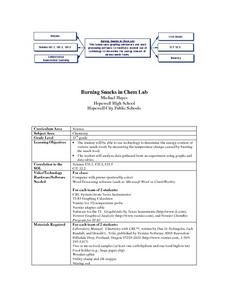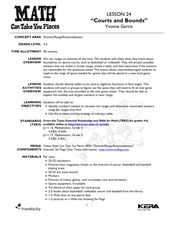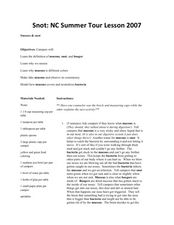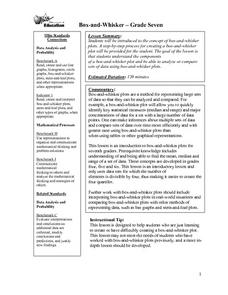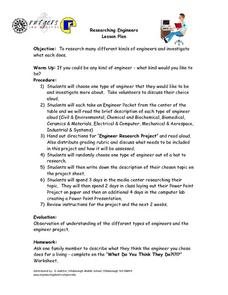Curated OER
Clay Exploration
Students create clay sculptures. In this sculpting lesson, students work in various stations to familiarize themselves with clay and use tools to make their own art piece.
Curated OER
Getting Familiar with Fractals
Young scholars use the Internet to answer lab questions about fractals, and then construct fractals using the initial stage and iteration rule. They complete tables and generate rules for the "nth" term and create their own fractals.
Curated OER
Wheat Kernels Bar Graph
Third graders create a bar graph to record how many kernels were in a wheat stalk. They write in math journals two questions from interpreting the graph. They solve math problems from other students.
Curated OER
Linear Patterns in Data
Eighth graders extend their learning of graphing linear equations and are introduced to connecting patterns in tables and graphs to represent algebraic representations. They then determine patterns and extrapolate information from these...
Curated OER
Burning Snacks in Chem Lab
Students determine the energy content of various snack foods. They measure the temperature changes in various snack foods as the foods are burned in order to determine the foods' energy content. Students create graphs and data tables of...
Curated OER
Courts and Bounds
Students relate what they know about boundaries on sports courts to explore range of space. In this domain and range lesson, students identify numbers needed to calculate ranges and use the problem solving strategy of making a table.
Curated OER
Snot: NC Summer Tour Lesson 2007
Students study various aspects of mucous. For this mucous lesson, students investigate the purpose of mucous. Students create fake mucous.
Curated OER
Gift Wrapping
Sixth graders use the example of a gift wrapping service found in the mall in order to create a problem situation that can be solved mathematically. They convert the word problem into algebraic expressions to be solved.
Curated OER
Putting It Together
Students create number combinations. In this problem solving lesson, students participate in a classroom activity that requires them to create as many object combinations as possible and multiplication sentences that compliment the...
Curated OER
How Powerful is Static Electricity
Students explore energy by participating in controlled electricity experiment. For this static electricity lesson, students identify the different sources that can create energy and how static electricity can be created very easily on...
Curated OER
Using Charts and Graphs to Study East Asia's Modern Economy
Students examine East Asia's modern economy. In groups, classmates use the internet to compare the resources, products, and economy of specified countries. After collecting the data, pupils create charts, tables and graphs. They...
Curated OER
Thanksgiving Web Quest
Students review the reasons why Thanksgiving is celebrated in the United States. Using the internet, they research the history of the holiday and discover what the first Thanksgiving was like. They also examine a typical menu for a...
Curated OER
Skin: Skin Prints
Students explore human anatomy by participating in a print experiment. In this human skin lesson, students define the term "epidermis" and utilize computer paper, pencils, tape and baby wipes to create a print of their own skin. Students...
Curated OER
Box-and-Whisker
Seventh graders are introduced to the concept of box-and-whisker plots. A step-by-step process for creating a box-and-whisker plot is provided. The goal of the lesson is that students study the components of a box-and-whisker plot and be...
Curated OER
Most Wanted Villians
Students review the characteristics of various characters in fairytales. As a class, they review the story details and create a concept map using a software program. They create their own wanted poster of the villians in the fairytale to...
Curated OER
Mathematics Within: Bar And Pie Graphs
Students compare and contrast the use of bar and pie graphs with the same data. They create a data set by surveying all students in the class using sticky notes to make a table on the board. Then, each student creates a bar and pie graph...
Curated OER
Ratios
Sixth graders investigate the concept of ratios and how they can be used to represent the comparison of quantities. The lesson is taught using a table or graph to compare two categories of data.
Curated OER
Naviagational Tools
Fifth graders create a compass, with the help of written instructions and then write six sentences discussing how compasses work and why they are helpful. They discuss the different types of navigational tools and how they are helpful.
Curated OER
Reciprocals of Quadratic Functions
Eleventh graders investigate inverse functions. In this Algebra II lesson, 11th graders use their prior knowledge of linear, exponential,and quadratic functions to create a graph of an equation they have never seen before.
Curated OER
How the West Was One: A Layered Book
Students create a layered book about the information they learn about the Western region of the United States. In this Western states lesson plan, students create a book about the land, economy, and culture.
Curated OER
Classification Introduction
Students simulate classifying rocks using different colored skittles. In this earth science activity, students create a Venn diagram according to their compiled information. They share this diagram in the class.
Curated OER
How Can We Keep Our Forests Intact and Have Our Chocolate Too?
Fourth graders explore various methods of growing and harvesting rainforest foods in order to sustain its biodiversity. They discuss the various uses for trees from several viewpoints. Students research chocolate demand and land use...
Curated OER
Using "Why Mosquitoes Buzz in People's Ears" to Teach Cause and Effect
Students discuss cause and effect relationships and the chain reaction involved before listening to the story "Why Mosquitoes Buzz in People's Ears". Students create flow charts to show the chain reactions of causes and effects in the...
Curated OER
Researching Engineers Lesson Plan
Students research different kinds of engineers and investigate what each one does. After completing three days of research and using a research guide sheet, they create a PowerPoint presentation of at least 8 slides but no more than 15.






